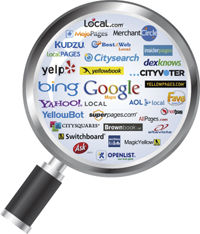
* Local search is one of the fastest growing categories of online advertising,
expected to increase as much as 10% per year through 2015.
* By 2015, 30% of all searches will be local, compared with 12% in 2009.
* 80% of all searches conducted via smartphone are for local products and
service.
The search engines are trying to provide the best local results for people searching on their computer and especially those searching on their mobile phones. Google Places, for example, allows consumers to easily and quickly find local relevant results and compare listings when they conduct a search for, like, “Chicago life insurance” or “San Diego car rental.”
You don’t need to have the deep pockets of a business like the hotel management company to capture the potential of local search and give yourself a competitive advantage.
We’ve listed five enhancements you can make to improve your local search results.
1. Optimize your on-page SEO
Make sure your basic search engine optimization (SEO) is in order, paying particular attention to long-tail, geo-specific keywords throughout your website. Those are specific phrases that tie together your industry name and location, such as “Chicago life insurance agent” or “car rental in San Francisco.”
It’s very important that you use proper keywords on your website in order to enhance your presence on major search engines. If you have more than one location, create unique web pages optimized for each location.
2. Set up location specific profiles
Claim and optimize your local profiles on search engines and directories (e.g., City Search, Yellow Pages, Google Places, chambers of commerce, review sites). Not claiming your profiles can hurt your business. People can add incorrect information when a profile is not claimed making it difficult for consumers to find your business.
For example, we read of one family restaurant that was failing to capture any of its town’s brisk tourist trade because Google had it listed as a grocery store, Yelp had it listed as an Italian restaurant, and Bing had it listed with the wrong address. None of the listings had the right phone number for the restaurant.
Claiming and optimizing your profiles ensure that this doesn’t happen to you. Search engine algorithms require consistency, so be sure your business’s name, address, and phone number are consistent across the Web. Also remember to populate all applicable fields with information, such as business description, images, categories, and hours of operation, etc.
Including as much information as possible in your local profiles will improve the chances of your business locations’ appearing in the results of relevant local search queries.
3. Encourage reviews and ratings
Encourage satisfied customers to rate your products and services via sites such as Trip Advisor, Yelp and Google. Nearly 70% of surveyed US consumers trust online consumer opinions as much as they trust personal recommendations, according to a 2010 BrightLocal survey.
Customer ratings help search engine placement and increase click-through rates. They also validate your business to search engines, showing that you’re actively serving customers and inspiring them to talk about you. This user-generated content influences the search engines’ decisions to position you higher than your competition.
4. Visuals are important
Videos and photos increase your appeal by making your offerings appear more tangible. Not to mention that search engines love them. Google is continually trying to improve the user experience as it relates to local searches. For example, Google recently started surfacing as many as five photos in its local search results from business’ Google Places pages.
Visuals help your rankings, appeals to consumers, and helps drive transactions. Customer testimonials, product or service demonstrations, answers to frequently asked questions, and images of your storefront and customer service staff are all good examples of relevant visual content.
5. Keep your profile updated
Make sure your business profiles have the most current information. Each month, update your profiles with specials, new products and services, photos and videos. If your location information changes, make sure to update it as well (phone number, hours of operation, etc.).
Remember that search engines like consistency, so make sure your updates are made across all platforms (e.g., Trip Advisor, Google Places, Yellow Pages, chambers of commerce, review sites).
Local SEO is more relevant than ever for geo-specific search queries. As the competition heats up among search engines to attract consumers who are looking for local businesses, businesses with strong organic and local rankings are best positioned to capitalize on this new trend.
Ontarget would be happy to help you setup and maintain your local marketing strategy. Please contact us if we can help or answer any questions.
